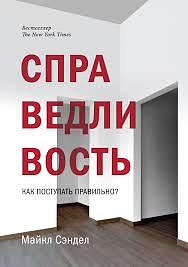You need to sign in or sign up before continuing.
Take a photo of a barcode or cover
O título talvez engane no Brasil, onde “justiça” é tão associada ao Direito. Apesar de ser relevante para o exercício judiciário, a obra de Sandel vai além ao tratar de questões morais e econômicas envolvendo a problemática da “qual a coisa certa a se fazer”?
Recheado de exemplos instigantes, cada capítulo foca em um pensador ou em uma teoria moral. Encontram-se aqui filósofos clássicos, como Kant (muito bem explicado, por sinal) e Aristoteles, até figuras centrais no debate contemporâneo, como Nozick e Rawls.
Vale a pena ser lido.
Recheado de exemplos instigantes, cada capítulo foca em um pensador ou em uma teoria moral. Encontram-se aqui filósofos clássicos, como Kant (muito bem explicado, por sinal) e Aristoteles, até figuras centrais no debate contemporâneo, como Nozick e Rawls.
Vale a pena ser lido.
For a techy guy like me, the book was very enlightening.
Even though the author has a personal preference on a specific justice philosophy, he spends most of the book presenting other possible ways very transparently.
It's very useful to help thinking about what we consider "just" and to re-evaluate our position on difficult arguments.
Even though the author has a personal preference on a specific justice philosophy, he spends most of the book presenting other possible ways very transparently.
It's very useful to help thinking about what we consider "just" and to re-evaluate our position on difficult arguments.
I read this book to get warmed up before I read Rawl's book on Theory of Justice. I've never been able to put it down ever since I started reading it. I wish I could give more than 5 stars to this book. Sandel talks about justice using three approaches: (1) as maximizing utility (2) respecting freedom (3) Aristotelian way of promoting good virtues. Each approach is progressively introduced with a set of modern and classical examples that leaves you convinced about that system of distribution of justice. Even though Sandel favors the third approach he is also cautious of not oversubscribing to that view as that can infringe on freedom. He seems to advocate the third approach that operates within a framework that doesnt endanger choice and freedom. After you read the book you will be left convinced that justice is very much entangled with politics, religious disputes and moral beliefs. Not all approaches are favorable all the time and strong public engagement/civic society is the only way to navigate through this on our path to becoming a just society.
I liked this a lot, particularly his lucid presentation of Kant’s moral philosophy. Not the easiest of challenges.
But I finished the last two chapters with an uneasy feeling that I was missing a trick. For full review please see: Michael Sandel on Justice.
But I finished the last two chapters with an uneasy feeling that I was missing a trick. For full review please see: Michael Sandel on Justice.
informative
inspiring
reflective
fast-paced
challenging
informative
medium-paced
challenging
informative
medium-paced
The cases were engaging. The key issues were explained in depth. The arguments were clearly laid out. The first 7-8 chapters laid the groundwork for Sandel to make his case in the final two chapters to introduce a third category of moral responsibility (i.e., solidarity). Unfortunately, it is the last two chapters that I had the most trouble with. The reasons for adding a third category of moral responsibility seems incomplete. Sandel provided anecdotes to illustrate his points, but they never quite come together to a coherent argument explaining why this category is necessary in order for public debate about the common good. Is it only because it seems otherwise impractical?


